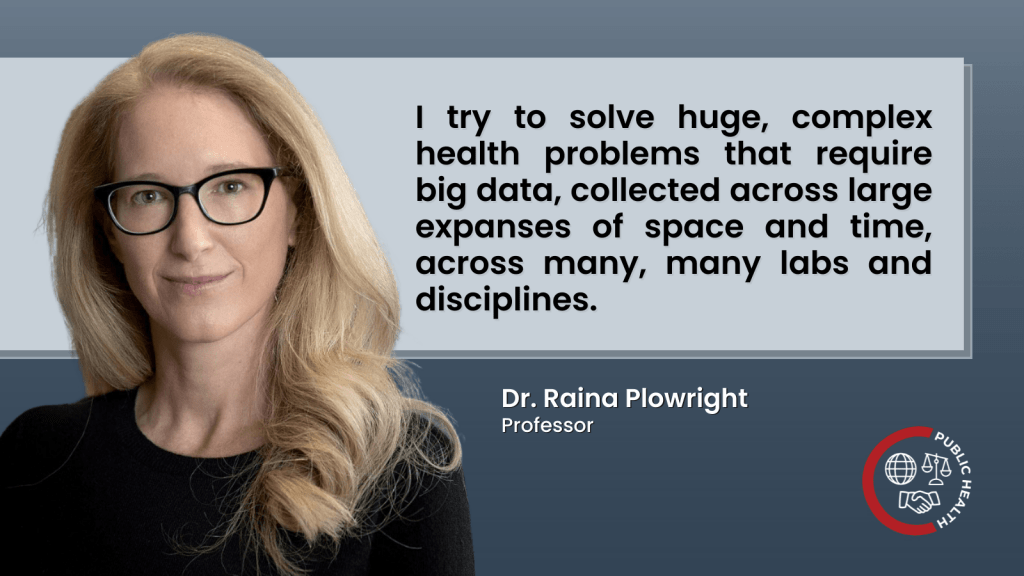Ecosystems & Pathogen Spillover
 “Cornell’s combination of public health and ecosystem health is a perfect fit—it marries all the elements of my research into one,” says Dr. Raina Plowright, a world-renowned ecologist and epidemiologist who joined Cornell in 2022 as a Radical Collaboration hire, Cornell Atkinson Scholar, and MPH Program professor in the new Department of Public & Ecosystem Health.
“Cornell’s combination of public health and ecosystem health is a perfect fit—it marries all the elements of my research into one,” says Dr. Raina Plowright, a world-renowned ecologist and epidemiologist who joined Cornell in 2022 as a Radical Collaboration hire, Cornell Atkinson Scholar, and MPH Program professor in the new Department of Public & Ecosystem Health.
In her research, Dr. Plowright seeks to understand how “disruptions to ecosystem health influence risks for zoonotic pathogen spillover,” or the spread of a virus or bacterium from one animal species to another. According to Dr. Plowright, pathogens spill over between species “thousands or millions of times daily,” such as when E. coli or salmonella move to humans through animal meat. There are also famous examples from history of pathogen spillover, she says, like the plague in the Middle Ages caused by a bacterium that has been traced back to gerbils in Central Asia but subsequently spread “from rats, to fleas, to humans” through trade routes, killing up to half of the population of Europe.
Dr. Plowright focuses on pathogens that rarely spill over between species, but when they do, there are often severe consequences, with human fatality rates of over 50%. Typically, these highly fatal diseases do not spread easily between humans. “But occasionally,” she says, “something comes along like SARS-CoV-2,” the virus that leads to COVID-19, which infects so many people that even with a relatively low fatality rate, the number of people who die or become severely ill represents “a massive public health burden.”
In a world where funders and policymakers tend to focus on biomedical research, Dr. Plowright says, her work is focused on essential ecological approaches. In May, she co-authored a commentary in the journal Nature, urging international leaders to “stop spillovers” and prevent pandemics by adopting ecological strategies. She also recently convened an international working group to develop policy guidance for adopting ecological countermeasures in international treaties. Dr. Plowright warns, “right now, the lack of prevention strategies that focus on factors that trigger pandemics is an international emergency.”
In 2022, Dr. Plowright was named a fellow of the American Association for the Advancement of Science for her work on the mechanisms of pathogen spillover from bats to humans. Hendra and Nipah viruses, which Dr. Plowright’s team studied in Australia, Bangladesh, and Ghana through long-term, transdisciplinary research, are shed by bats and can spill over to humans, either directly or through agricultural animals, often with deadly consequences.
Bats illustrate the key role that ecosystems play in mediating pathogen spillover events, says Dr. Plowright, who is principal investigator with the Bat One Health research consortium. “The loss of critical habitat combined with climate anomalies contributes to stress and higher viral shedding, along with a greater likelihood that bats will feed in areas with humans and livestock.” Dr. Plowright—whose models now help predict high spillover years for Hendra virus in Australia—has a forthcoming paper in Nature that shows “how restoration and preservation of habitat can stop spillover events.”
Written by Audrey Baker
